Related Research Articles
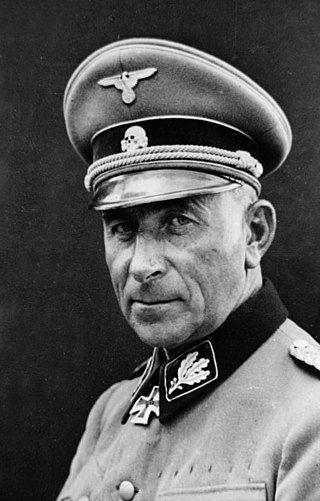
Paul Hausser also known as Paul Falk after taking his birth name post war was a German general and then a high-ranking commander in the Waffen-SS who played a key role in the post-war efforts by former members of the Waffen-SS to achieve historical and legal rehabilitation.

The Ordnungspolizei, abbreviated Orpo, meaning "Order Police", were the uniformed police force in Nazi Germany from 1936 to 1945. The Orpo organisation was absorbed into the Nazi monopoly on power after regional police jurisdiction was removed in favour of the central Nazi government. The Orpo was controlled nominally by the Interior Ministry, but its executive functions rested with the leadership of the SS until the end of World War II. Owing to their green uniforms, Orpo were also referred to as Grüne Polizei. The force was first established as a centralised organisation uniting the municipal, city, and rural uniformed police that had been organised on a state-by-state basis.

Komet (HSK-7) was an auxiliary cruiser of Nazi Germany's Kriegsmarine in the Second World War, intended for service as a commerce raider. Known to the Kriegsmarine as Schiff 45, to the Royal Navy she was named Raider B.

The War Order of the German Cross, normally abbreviated to the German Cross or Deutsches Kreuz, was instituted by Adolf Hitler on 28 September 1941. It was awarded in two divisions: in gold for repeated acts of bravery or military leadership; and in silver for distinguished non-combat war service. The German Cross in Gold ranked higher than the Iron Cross First Class but below the Knight's Cross of the Iron Cross, while the German Cross in Silver ranked higher than the War Merit Cross First Class with Swords but below the Knight's Cross of the War Merit Cross with Swords.
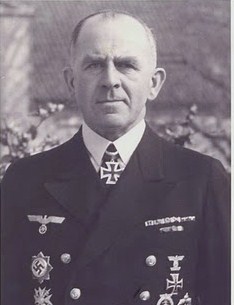
Otto Ciliax was a German naval officer who served in the navies of the German Empire, the Weimar Republic and Nazi Germany. As an admiral during World War II, he commanded the German battleships. He was a recipient of the Knight's Cross of the Iron Cross.
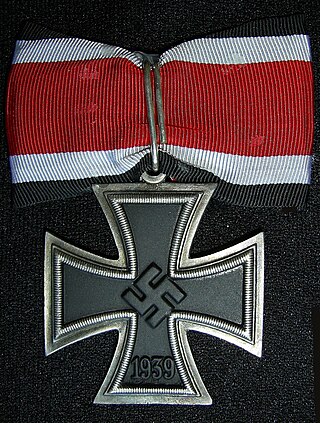
The Knight's Cross of the Iron Cross, or simply the Knight's Cross , and its variants, were the highest awards in the military and paramilitary forces of Nazi Germany during World War II. While it was lower in precedence than the Grand Cross of the Iron Cross, the Grand Cross was never awarded at-large to Nazi German military and paramilitary forces. The Grand Cross' sole award was made to Reichsmarschall Hermann Göring in September 1939, making the Knight's Cross the de facto highest award among the decorations of Nazi Germany.
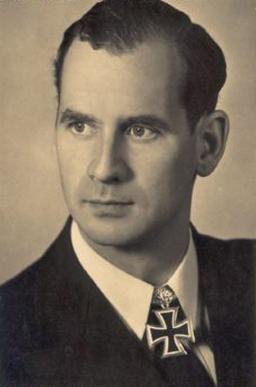
Otto von Bülow was a German U-boat commander in World War II, and a captain in the Bundesmarine. He was a recipient of the Knight's Cross of the Iron Cross with Oak Leaves of Nazi Germany.

Smilo Walther Hinko Oskar Constantin Wilhelm Freiherr von Lüttwitz was a German general during World War II and son of Walther von Lüttwitz. After World War II he joined the Bundeswehr on 1 June 1957 and retired on 31 December 1960.

Heinz Harmel was a German SS commander during the Nazi era. He commanded the 10th SS Panzer Division Frundsberg during World War II. Harmel was a recipient of the Knight's Cross of the Iron Cross with Oak Leaves and Swords of Nazi Germany.

The Croatian Naval Legion was a contingent of volunteers from the Independent State of Croatia that served with Nazi Germany's navy Kriegsmarine, on the Black Sea and Adriatic Sea during World War II.

Heinrich Bleichrodt was a German U-boat commander during the Second World War. From October 1939 until retiring from front line service in December 1943, he was credited with sinking 25 ships for a total of 152,320 gross register tons (GRT). He was awarded the Knight's Cross of the Iron Cross with Oak Leaves of Nazi Germany. Bleichrodt was tried and acquitted for war crimes in connection with the sinking of the SS City of Benares, which was carrying evacuated children. He earned the nickname "Ajax" during his time with the U-boats.
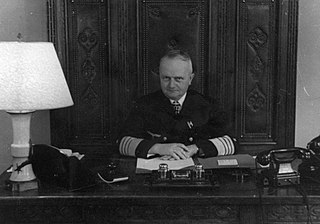
Alfred Saalwächter was a high-ranking German U-boat commander during World War I and General Admiral during World War II.

Paul Conrath was a German general during World War II. He was a recipient of the Knight's Cross of the Iron Cross with Oak Leaves of Nazi Germany.
Hans-Joachim Kroschinski was a former Luftwaffe fighter ace and recipient of the Knight's Cross of the Iron Cross during World War II.
The action of 13 May 1942 was a naval engagement during World War II between the British Royal Navy and the German Kriegsmarine. It was an attempt by Royal Navy Motor Torpedo Boats (MTBs) to stop the German auxiliary cruiser Stier from reaching Gironde, France. Stier made it through the English Channel and reached Gironde, but MTBs sunk the German fleet torpedo boats Iltis and Seeadler. MTB 220 was sunk by the German ships.

Franz Kurowski was a German author of fiction and non-fiction who specialised in World War II topics. He is best known for producing apologist, revisionist and semi-fictional works on the history of the war, including the popular English-language series Panzer Aces and Infantry Aces.
References
- ↑ "Search Results: Osprey Publishing (UK)".
- ↑ "Book review – E-Boat vs. MTB: The English Channel 1941–45". National Historical Foundation.
- ↑ Dear, Paul. "Book Review : Salute to the Honored Military Decoration". Los Angeles Times, August 8, 1985.